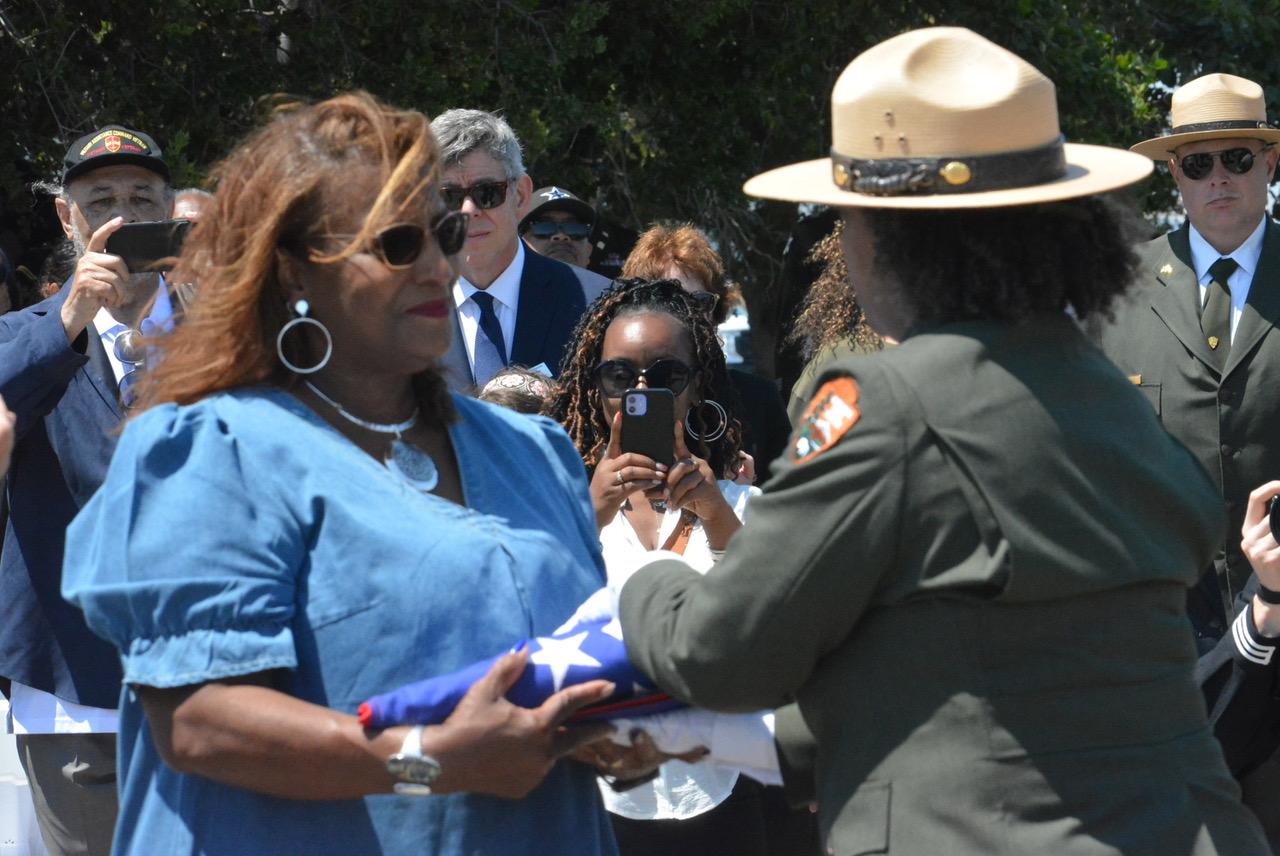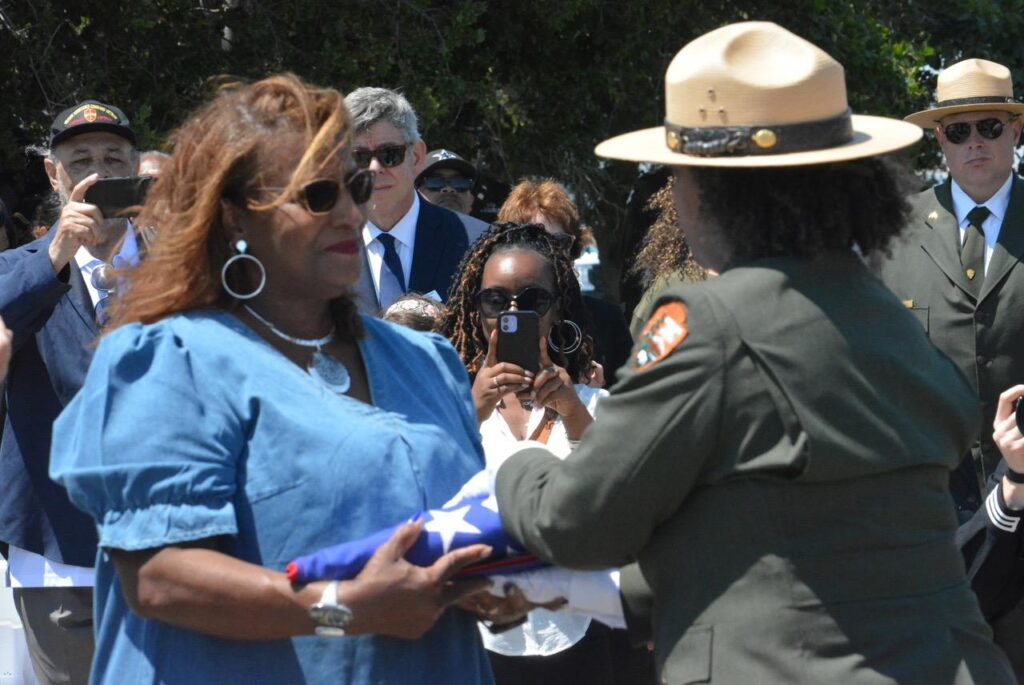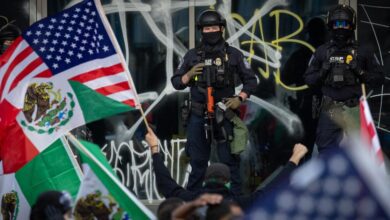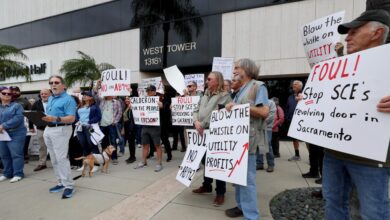Navy Exonerates 256 Black Sailors Accused of Revolt In 1944

By Antonio Ray Harvey | California Black Media

Three days after U.S. Secretary of the Navy Carlos Del Toro posthumously exonerated the remaining 256 African American Port Chicago defendants who were court-martialed for mutiny in 1944, he visited the historical site to participate in the 80th-year commemoration of the worst homefront disaster in the U.S. history.
Del Toro said the occasion at the Port Chicago Naval Magazine Memorial on the Suisun Bay, 35 miles north of San Francisco in Contra Costa County, was two-fold. According to him, the 90-minute ceremony was organized to honor all who died in the blasts and officially announce the absolving of Black men who were unjustly court-martialed for refusing to load bombs on naval cargo ships during World War II due to safety concerns.
“This event marks a turning point in our nation’s history, a moment when we confront the ghosts of the past and embrace the promise of more justice,” Del Toro said. “For eight decades, the story of Port Chicago has been a stark reminder of a grave injustice. We as a nation will never be able to express our full gratitude to all deceased and their families for their dedication, service, and sacrifice.”
On July 20, a diverse group of 500 people were shuttled from the Military Ocean Terminal Concord (MOTCO) to the Port Chicago Naval Magazine Memorial where two deadly explosions occurred on the night of July 17, 1944.
The ceremony was hosted in partnership with the National Park Service (NPS), Friends of Port Chicago National Memorial, and the U.S. Army’s 834th Transportation Battalion.
The event also marked the 30th year the site was erected as a memorial.
Along with Del Toro, dignitaries and elected officials in attendance were U.S. Congressmen John Garamendi (D-CA-08) and Thurgood Marshall Jr., whose father, Supreme Court Justice Thurgood Marshall, sought justice for the Port Chicago 50, the Black men who were wrongfully convicted in the fall of 1944 of insubordination during World War II.
Kelli English, the NPS’s service-wide Program Manager for Cooperating Associations and Partnerships, said tears from colleagues were flowing the day they heard about the exoneration of the men. English is part of the NPS crew that conducts tours of the National Memorial and shares the history of the tragedy.
“They never should have been court-martialed in some cases and convicted of other cases, but it does provide some closures for the families and descendants of those men,” English told California Black Media. “It’s so important to us. It’s the only amount of justice delivered years after the fact.”
The blasts resulted in the death of 320 sailors, 202 of them Black American sailors who were loading nearly 5,000 tons of munitions from a train into the naval cargo ships. About 400 more people were injured and the cargo train and both ships – SS Quinault Victory and SS EA Bryan – were destroyed.
The explosion shook the San Francisco Bay and could be felt as far away as Nevada. The blasts damaged many surrounding structures and buildings in the nearby town of Port Chicago. In the mid-1960s, the United States government bought 5,000 acres of land in the Port Chicago area and the town ceased to exist by 1969.
The White officers in command were given hardship leaves while the surviving Black sailors were ordered to clear debris from the blasts and painfully retrieve the appendages of their fellow servicemen. The treatment of the Black sailors exemplified the racial policies manifested by the Navy.
After threats of disciplinary action, 208 of the Sailors resumed work but it did not stop the Navy from convicting the men at a summary court-martial for rebellion. Over the years, two sailors had the charges expunged from their records, which left 256 convicted Black men.
Fifty of the Black sailors stood their ground and in September 1944 were found liable for mutiny, a serious offense that tarnished their military record. The 50 sailors were represented by Thurgood Marshall, who was the chief counsel for the NAACP Legal Defense and Educational Fund, the disaster and racism in the Navy led to President Harry Truman desegregating all four branches of the military.
Ten years later, Marshall was able to win the monumental Brown v. Board of Education case that ruled separate but equal public schools were unconstitutional.
“It’s deeply moving to me that his work and the work of the NAACP Legal Defense Fund caught the attention of the sailors, and the family involved in Port Chicago,” Marshall Jr. said of his father who later became a US Supreme Court Justice. “They contacted them for guidance, and he was able to come out here to California to do what he did so well.”
Carol Cherry traveled from Chicago to attend the 80th ceremony. Her father Cyril Oscar Sheppard Jr. is now officially one of the 50 former mutineers. Cherry was presented with the ceremonial U.S. flag by the English.
Rev. Diana McDaniel, President of the Friends of Port Chicago National Memorial was one the guest speakers. Her uncle Irvine Lowery was one of the surviving Black sailors who was ordered to collect the remains of the deceased after the explosion. McDaniel told CBM that Lowery was injured in the blast when he was in the barracks but was not aware of it.
Other speakers at the event included English, NPS Superintendent K. Lynn Berry, Supervisory Park Ranger, Hilary Grabowska, and Lt. Col. Lauren Cabral, MOTCO Commander of the 834th Transportation Battalion
“I ask that all of you amplify the message so that we can get to many family members that we have not been able to reach to let them know what has occurred,” Del Toro told reporters.




